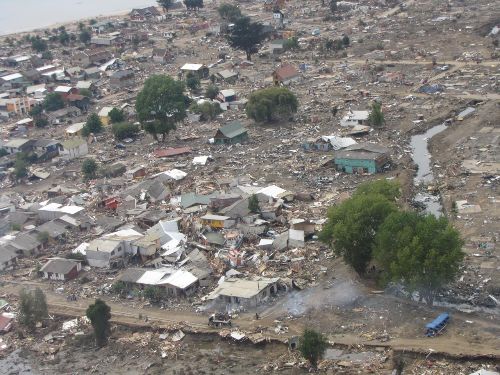Geological urbanism: articulating earthly forces and urban processes in Chile

Context and thesis
This project explores the various effects of one specific geological event – a mega-earthquake followed by a huge tsunami – over the rationales, actors and instruments shaping urban politics in Chile. A core interest here is the relationship between disasters and urban cosmopolitics – the latter understood as the search for common worlds of cohabitation amongst heterogeneous human and nonhuman actors. As such, urban cosmopolitics is particularly concerned with exploring the political capacities of non-human actors. Disasters, such as the Chilean earthquake/tsunami, thus do not just entail processes of socio natural or sociotechnical disassembling, but they make apparent the pervading presence of earthly forces hitherto excluded from the existing designs of urban worlds.
Taking into account the tsunami as a dangerous geo-urban entanglement posed a major challenge to the neoliberal framework of urban politics that has persisted in Chile since the 1970s. Firstly, it put to test the capacity of the existing urban government arrangements, specifically those that had been shaped by the municipalisation of urban planning prerogatives and a market-based approach to social housing provision, to react and adapt to the criticalsituation. Secondly, by making apparent the criticaldependence of urban processes on earthly forces, theearthquake/tsunami led to reconceiving the art of governmentfrom a focus on the indirect regulation of autonomous urban dynamics (ie. markets) towards the masterplanning and constructing of ‘new’ urban assemblages. Interestingly, this entailed the emergence of new experts and knowledge forms hitherto not taken into account in the governance of urban processes, especially oceanographers holding expertise in the modelling of tsunamis, but also urban designers, as well as new approaches to citizen participation.
Case studies
The project has focused on a series of case studies that highlight different aspects of this transformation.
1. Tsunamis as political events
Focusing on the controversy surrounding the failure of the anti-tsunami warning system to recognize the occurring tsunami, this case study explores the capacity of earthly forces to exceed techno-scientific models and emerge as irreducible and powerful political actors.
2. Housing or market reconstruction?
By studying the practical consequences of the government’s decision to approach the challenge of housing reconstruction by adapting existing social housing market arrangements, this case study provides a re-description of neoliberalism as a governmental practice based on situated improvisation.
3. Municipal governance experiments
By looking at the two most affected regions, it has been possible to identify two governance strategies devised by municipalities to cope with the disaster situation, namely, creating governance consortiums with private corporations and passing on their planning prerogatives to the regional administrative level. Research has explored the logics of exception grounding these municipal governance experiments.
4. Master plans as cosmograms
Perhaps the most salient feature of the reconstruction processin Chile has been the elaboration of master plans forcity reconstruction, even though this instrument of territorial planning is not foreseen in any legislative body. We explore master plans as abstract diagrams of a possible urban cosmos.
5. Devising inhuman urbanity
By focusing on the construction of so-called anti-tsunamiparks, and the different socio-technical controversies linked to them, this case study explores the proliferation of new urban expertises concerned with exploring techno-natural arrangements for softening the irruption of inhuman forces in the urban realm.
Research activities 2014/2015
Last year, activities mostly focused on writing up scientific articles from the municipal governance experiments case study, as well as expanding the notion of urban cosmopolitics in a broader research program for urban studies. Beyond this, the possibility of compiling the main results into a monograph is being explored.
Project Publications
Farías, Ignacio & Flores, Patricio. Forthcoming. “A differentstate of exception. Governing urban reconstructionin post 27F Chile”. Urban Studies
Block, Anders & Farías, Ignacio (Eds.) 2016. Urban Cosmopolitics.Agencements, Assemblies, Atmospheres. London, New York: Routledge
Farías, Ignacio. 2014. “Misrecognizing tsunamis: ontologicalpolitics and cosmopolitical challenges in earlywarning systems.” The Sociological Review 62, pp. 61-87.
Farías, Ignacio. 2014. “Improvising a market, making amodel. Social housing policy in Chile during Pinochet’sneoliberal ‘modernisation’ and after the 2010 earthquake”, in Economy and Society, Vol. 43(3), pp. 346-369.
Farías, Ignacio. 2014. “Planes maestros como cosmogramas.La articulación de fuerzas oceánicas y formasurbanas tras el tsunami de 2010 en Chile”. Revista Pléyade, Vol. 14, pp. 119-142.
Farías, Ignacio. 2013. “Die Improvisation einer Politik: Katastrophenbewältigung, neoliberale Experimente und die Grenzen ökonomischen Wissens”, in J. Adams & A.Vonderau (Eds.) Formationen des Politischen: Anthropologiepolitischer Felder. Transcript Verlag, pp. 33-61.